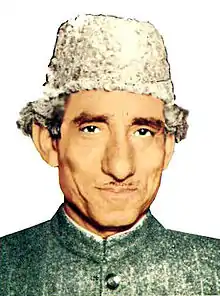Ghulam Mustafa Tabassum
Ghulam Mustafa Tabassum (Urdu: غُلام مُصطفیٰ تبسّم ), (4 August 1899 – 7 Feb 1978) was a 20th-century poet. His pen name was Tabassum (Urdu: تبسّم ).[1][2]
Sufi Tabassum صُوفی تبسّم | |
|---|---|
 | |
| Born | Ghulam Mustafa 4 August 1899 Amritsar, Punjab Province, British India |
| Died | 7 Feb 1978 (aged 79) Lahore, Pakistan |
| Occupation | Poet and Author |
| Nationality | Pakistani |
| Genre | Fiction |
| Subject | Literature |
He is best known for his many poems written for children, as the creator of the Tot Batot character, and as the translator of many poetical works from mostly Persian into Punjabi and Urdu languages.[1]
Early life and career
Sufi Tabassum was born on 4 August 1899 in Amritsar, Punjab, to parents of Kashmiri ancestry. He earned a master's degree in Persian language from Forman Christian College (FCC) in Lahore, Pakistan. He worked for and remained with Government College Lahore for his entire career, rising to head the Department of Persian Studies in 1943. Tabassum retired from Government College in 1954.[2][1]
Sufi Tabassum was also closely associated with the members of an informal literary circle called Niazmandan-i-Lahore. This circle's members included Pakistan's noted literary personalities including Patras Bokhari, Abdul Majeed Salik, Imtiaz Ali Taj, M. D. Taseer, Chiragh Hasan Hasrat, Hafeez Jalandhari, Abdur Rahman Chughtai and Majeed Malik.[1] Sufi Tabassum also edited the magazine Lail-o-Nahar for a while in addition to working for Radio Pakistan, Pakistan Arts Council and Iqbal Academy.[1]
In Pakistan, he is considered to be a pioneer in children's poetry. His popular poems for children are Totbatot and Jhoolnay.[2]
His poetry featured on radio and television
For fifty years, he was actively participating on Radio Pakistan and Pakistan Television poetry events.[1] His poems were used as the lyrics of several songs sung by Noor Jehan, Naseem Begum, Farida Khanum and Ghulam Ali.[3]
| Song | Singers | Song lyrics by | Music by | Film or Produced by |
|---|---|---|---|---|
| "Sau Baar Chaman Mehka, Sau Baar Bahar Aaee" | Naseem Begum[4] | Ghulam Mustafa Tabassum | Rasheed Attre | film Shaam Dhalay (1960) |
| "Aye Puttar Hattan Tay Nahin Vikday, Tuun Labhdi Phirrein Bazaar Kurray" | Noor Jehan[3][2] | Ghulam Mustafa Tabassum | Hassan Latif Lilak | A Radio Pakistan, Lahore[1] production (A Qaumi Naghma from 1965 war) |
| "Who Mujh Say Huay Ham Kalam Allah Allah"[1] | Farida Khanum | Ghulam Mustafa Tabassum | Hassan Latif Lilak | A Pakistan Television, Lahore production |
| "Meray Shauq Da Nahin Aetbar Teinun"[1] | Ghulam Ali[5] | Ghulam Mustafa Tabassum | A Pakistan Television[1] production ('Nikhar' PTV program-1973) | |
| "Meray Dhol Sipaya Teinun Rab Dian Rakhhaan"[1] | Shehzad Roy and Ayesha Omer[6] | Ghulam Mustafa Tabassum | Another 1965 War Qaumi Naghma redone by Shehzad Roy. This Qaumi Naghma was originally sung by Madam Noor Jehan. |
Awards and recognition
- In 1962, he received the Pride of Performance Award from the President of Pakistan
- In 1966, he received the Tamgha-e-Nishan-e-Sipaas award of the Government of Iran.[2]
- He was also awarded the Sitara-i-Imtiaz, Award (Star of Excellence) by the President of Pakistan.[7]
Works (partial list)
- Tot Batot Collection. Published by Ferozsons (no date), ISBN 969-0-01118-9[1]
- Ab Sab Hain Tot Batot Mian, Published by Gulzar Ahmed, 2000
- Jhoolnay (collection of poems for children), Published by Ferozsons (no date)
- Doguna. Published by Ferozsons (a translation of the works of Hazarat Amir Khusrow)
- Sawan Raina Da Sufna, a translation into Punjabi of Shakespeare's A Midsummer Night's Dream, unknown publisher
- Talmatol (collection of poems for children)[1]
- Daman-i-Dil[1]
- Kulliyaat-i-Sufi Tabassum (Poetry in Urdu language)[1]
- Nazraan Kardiyaan Gallaan (Poetry in Punjabi language)
- Naqsh-i-Iqbal (Punjabi translation of Allama Iqbal's poetry)[1]
References
- Rauf Parekh (8 February 2016). "LITERARY NOTES: Sufi Tabassum: a scholar and trilingual poet". Dawn (newspaper). Retrieved 12 April 2019.
- "Profiles of many notable Poets including Ghulam Mustafa Tabassum". Almanac of Pakistan. Overseas Pakistanis Foundation. December 2006. Archived from the original on 22 September 2008. Retrieved 12 April 2019.
- Hamid, A (26 November 2006). "Nur Jehan: One in a Million". Daily Times (newspaper) (in Urdu and English). APNA (Academy of the Punjab in North America). Retrieved 12 April 2019.
- Ghulam Mustafa Tabassum film song on IMDb website Retrieved 12 April 2019
- Ghulam Mustafa Tabassum song on YouTube Retrieved 12 April 2019
- Ghulam Mustafa Tabassum song on YouTube Retrieved 12 April 2019
- Ghulam Mustafa Tabassum's Sitara-i-Imtiaz Award info on rekhta.org website Retrieved 12 April 2019